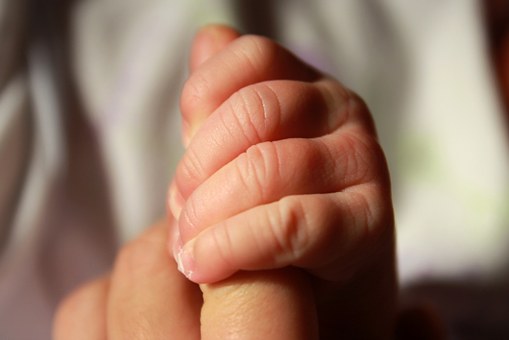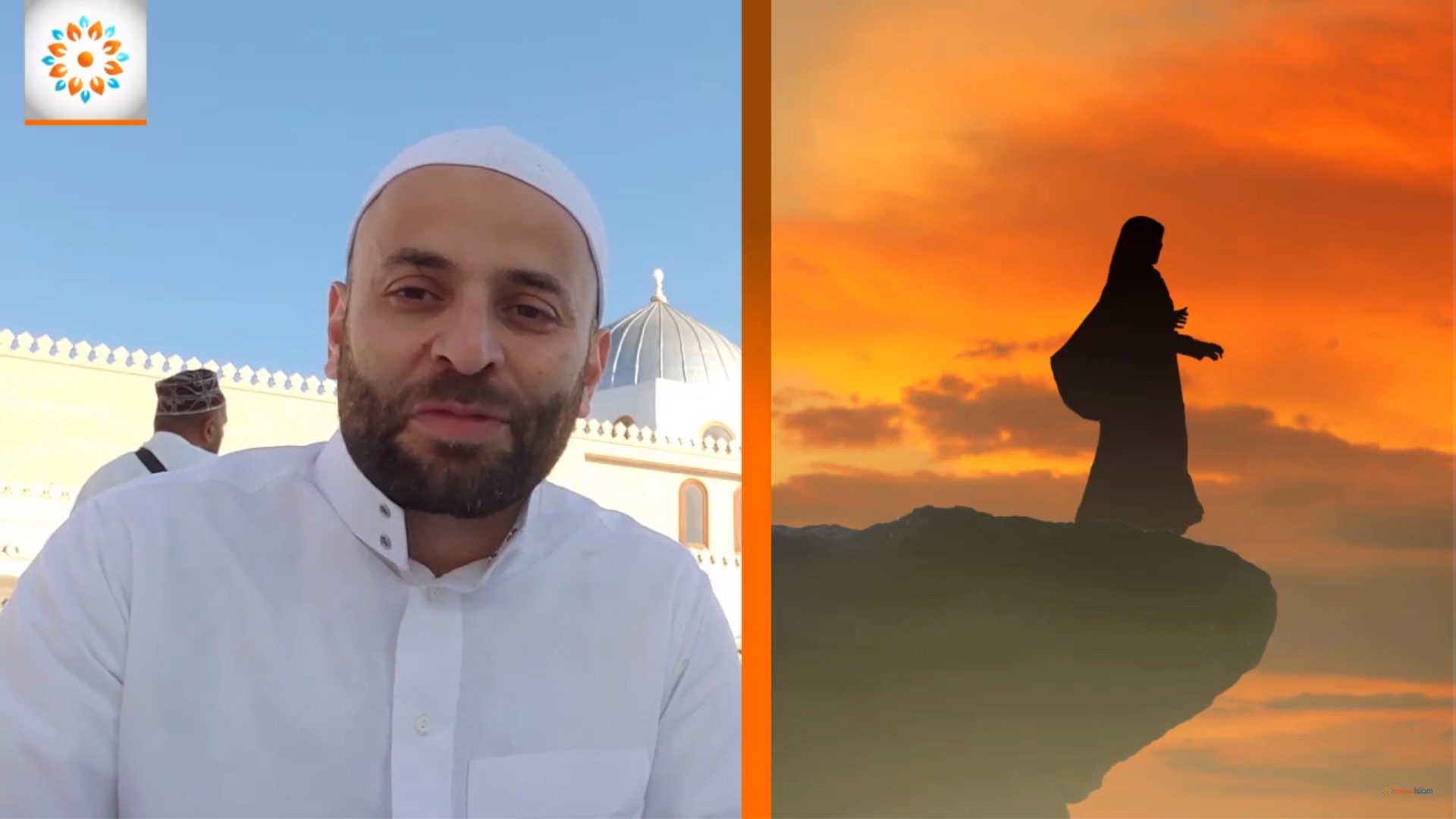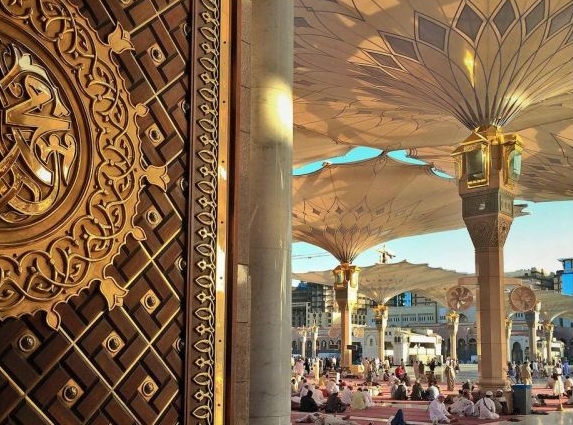
In common use, gratitude to Allah is defined as devoting all that Allah has bestowed upon you to that for which He has created you.
Hence, gratitude transcends speech to a state of being that manifests in one’s character. Allah Almighty clarifies that this rare quality of spiritual devotion is not at all limited to speech:
{Work, O family of David, in gratitude. And few of my servants are grateful} (Saba’ 34: 13).
Gratitude has been mentioned on over seventy different occasions in the Quran.
Allah almighty praises thankful servants and promises them a pleasant reward. He also prohibits us of its opposite. This emphasis on gratitude brings to light its crucial significance. (Akhlaq an-Nabi fil Kitab was-sunnah)
A Quality of the Best Believers
It is a quality that Allah mentioned to distinguish His prophets (peace be upon them) and favored servants. Allah said of Noah (peace be upon him):
{O descendants of those We carried [in the ship] with Noah. Indeed, he was a grateful (shakur) servant.} (Al-Isra’ 17: 3)

These Prophets Were Separated from Families Too... What to Learn from Them?
The verse uses the form “shakur” to indicate affirmed emphasis of this quality in Prophet Noah (peace be upon him).
He also described Ibrahim (peace be upon him):
{[He was] grateful for His favors. Allah chose him and guided him to a straight path} (An-Nahl 16: 121)
He also says of Luqman:
{And We had certainly given Luqman wisdom [and said], “Be grateful to Allah.” And whoever is grateful is grateful for [the benefit of] himself.} (Luqman 31: 12)
Imam ibn Kathir interpreted:
“That is, we commanded him to be grateful for the grace that We bestowed upon him that distinguished him from the people of his time” (Ibn Kathir, Tafseer Al-Qur’an Al-Azeem).
Hence, these examples indicate that gratitude is a primary quality conveyed and enacted by all Prophets, especially the beloved seal of Prophets, Muhammad (peace and blessings be upon him), who said:“Indeed, I was sent to perfect the honorable manners” (Ahmad).
“As for the believers, they are at varying degrees in fulfilling their duty of expressing gratitude. This variance in degree correlates with their awareness of these blessings and their actualization of the essence of servitude to Allah.
Thus, whosoever performed this quality in a fashion that is pleasing to Allah has achieved the honor of falling under the general divine praise {And few of my servants are grateful}.”(Akhlaq an-Nabi fil Kitab was-sunnah)
Prophet Muhammad’s Gratitude (PBUH)

These 9 Lovely Hadiths Show Prophet’s Care for Children
The entire life of our dearly beloved Prophet (peace and blessings be upon him) can be viewed as a manifestation of utmost gratitude.
One who observes his character, his sayings, his actions and his entire lifestyle will be obliged to concur that he was a truly grateful servant of his Creator.
`A’ishah (may Allah be pleased with her) said:
The household of Muhammad (peace and blessings be upon him) never filled their stomachs of wheat bread two consecutive days to the day he passed away” (Shama’il At-Tarmidhi).
Ibn `Abbas (may Allah be pleased with him) said:
“The Prophet of Allah (peace and blessings be upon him) passed away without leaving adinar (gold coin) or a dirham (silver coin)…
By Allah, nights would pass in the household of Muhammad (peace and blessings be upon him), and they would not find dinner” (Ahmad).
Anas (may Allah be pleased with him) reported:
We were by the Prophet of Allah (peace and blessings be upon him) while `Umar was in his presence. The Prophet was lying on a bed made of palm leaves, and beneath his head was a pillow; there wasn’t a barrier between his side and the palm leaves. When he made a slight movement, it was evident that the palm affected his sides.
So, `Umar began to weep, and the Prophet (peace and blessings be upon him) inquired, “Why do you weep?” He said:
“How can I not weep when I know that you are dearer to Allah than Kaiser and the Caesar. Yet, they are living such lavish lives in this world”.
So the Prophet (peace and blessings be upon him) said:
“O `Umar wouldn’t you be pleased if the hereafter is ours and this life is for them?” (Al-Hafiz Al-Asbahani, Akhlaq An-Nabi wa Adabuh. The last excerpt of the hadith is also found in Sahih Muslim)
Expressing Gratitude through Worship

What Aisha Would Do When She Felt Angry with the Prophet (PBUH)
The Prophet (peace and blessings be upon him) showed utmost gratitude in his worship to Allah.
He would pray a large part of the night throughout the year, and his gratitude would even increase in times of special divine bounty. `A’ishah reported:
When the last ten nights of Ramadan entered, the Prophet (peace and blessings be upon him) would revive the night in worship and awake his family…” (Al-Bukhari and Muslim)
`A’isha also reported:
When the Prophet (peace and blessings be upon him) prayed (the night prayers: Qiyam-ul-layl), he would stand until (the skin of) his feet swelled. So, I said:
“O Prophet of Allah, do you do as such while Allah has forgiven you all mistakes?”
He responded: “Should not I be a grateful servant of Allah?” (Muslim)
Imam ibn Hajar commented on the hadith:
“The meaning is that since I have been forgiven all of my mistakes, this is a reason for night prayers being a form of gratitude towards Allah, so how can I abandon it? Imam Al-Qurtubi clarified:
Those who asked him this question assumed that he withstands such burdens in worship to Allah from fear of sins and hope of forgiveness. So, he clarified to them that there is another path of worship which is to express gratitude for forgiveness. The scholars said: The prophets have maintained such deep fear of Allah because of their knowledge of His immense blessings upon them.” (Ibn Hajar, Fath El-Bari)
Ibn Battal said:
“This hadith is indicative that the individual should take upon himself a stricter path in servitude, even if that may take a toll on his body because if the Prophet (peace and blessings be upon him) did that while being certain of having been forgiven, what should be the condition of one who does not have that certainty, let alone one who is insecure of deserving hellfire.” (Ibid)
Balance Is Necessary

Surah Ad-Duha Consoled the Prophet (PBUH) & Can Relieve You Too
However, it should be noted that Imam Ibn Hajar modified the understanding of the statement of Ibn Battal:
“This mindset should be in a case that it will not lead the individual to boredom and retreat from worship because the condition of the Prophet (peace and blessings be upon him) was most complete, and he never retreated from worshipping his Lord.
So, if one fears boredom and retreat, he should not force himself upon such acts. Hence the prophet (peace and blessings be upon him) said “Take of the actions that which you can withstand…” (Ibid. With a slight abridgment of the original quote)
Special Relation with Allah (SWT)
Another example of the Prophet’s gratitude is that he would seek forgiveness of Allah after performing the five daily prayers:
“Some have raised a query as to how he seeks forgiveness while being forgiven, and Imam ibn Sayyid An-Nas responded:
“This displays his loyalty to the duties of servitude and his practice of gratitude, and so that he may clarify his Sunnah by action just as he has done so in speech.” (Al-Mubarkaafuri, Tuhfat Al-Ahwazi Sharh Sunan At-Tirmizi)
Similarly, it was reported that he sought refuge in Allah from the punishment of the grave. If the query is raised as to why he would seek refuge while he is already assured protection, the response is:
“He did so to display his need of Allah, to acknowledge His blessings and to express his gratitude for continually renewed blessings.
One who has immense blessings from Allah Almighty must receive such blessings with immense gratitude. The subservience of individuals to Allah is in accordance with their knowledge of Him.” (Ibn Battal, Sharh Sahih Al-Bukhari, with a slight abridgement)
Spreading Gratitude
Gratitude was not just something our beloved Prophet (peace and blessings be upon him) practiced and professed; rather, it was a quality he instilled within his companions.

12 Prophetic Methods of Education
On one occasion, the Prophet (peace and blessings be upon him), Abu Bakr and `Umar (may Allah be pleased with them) left their homes hungry. They were hosted by a man from Al-Ansar who offered them a stem of dates and they ate from it until they quenched their hunger. At that point the beloved Prophet (peace and blessings be upon him) recited:
{Then you will surely be asked that Day about pleasure} (At-Takathur 102: 8)
He said to Abu Bakr and Umar:
“This is of the blessings you will be asked about” (Al-Hafiz Al-Asbhani, Akhlaq An-Nabi wa-adabuh)
These prophetic examples ingrained within the companions the realization of divine blessings. Such blessings may often be overlooked as necessary or expected in the eyes of those less spiritually conscious. But it is that realization that will facilitate the route to higher degrees of gratitude. It will ultimately lead to the believer living a life of excellence (ihsan). They will consistently feel that Allah is overseeing us in our affairs. They even witness Him in His countless blessings in the creation of the heavens and the earth.
Thus, our path to embodying the prophetic example is to first realize the comprehensive scope of gratitude, and its merit in the eyes of Allah, and its relation to other religious teaching.
How to Enhance our Gratitude
Our gratitude may be enhanced by building our awareness of Allah and His sovereignty over our affairs. The fruits of such esteemed realization should become apparent in one’s personal and social life as it was evident in the life of Allah’s favored servants. Allah says:
{And [remember] when your Lord proclaimed, ‘If you are grateful, I will surely increase you [in favor]; but if you deny, indeed, My punishment is severe.’} (Ibrahim 14: 7)
And He also said:
{So remember Me; I will remember you. And be grateful to Me and do not deny Me} (Al-Baqarah 2:152)
Contentment: Sign of a True Believer
– “How much money do you have?’’
– “I have millions.”
– “Do you want more?”
– “Yes, I do.”
– “How many children have you got?”
– “I have three.”
– “Do you want more?”
– “Yes, I do.”
Think of the “how many” and “how much” questions you can ask someone and his expected answers. The answers are very normal. You know why?
Because it is natural that people want to be richer, healthier, and more famous than others. If one has a Land Cruiser car, he aims for a Jaguar. If he has one house, he wants to have a second then a third. It is very rare to find someone who would answer: “No. I do not want … I am happy with what I have.”
But such an answer is expected from someone who has a degree of faith in his heart.
Belief is the driving power that makes you feel content with things that have been destined for you. Through belief, one can enjoy the blessings of this life and earn Allah’s pleasure in the world to come.
Contentment is a sign of a true believer. When one is afflicted with catastrophes and shows patience and contentment and does not complain about his sufferings; be sure that he is indeed a true believer.
By this, we are not saying that those who want to be richer, healthier, more famous, etc. are not believers. But they lack the complete understanding of belief. Contentment does not mean that you do not feel the pains and trials of this life. You feel them, but you do not complain about them.
The virtue of contentment is closely connected with the virtue of putting trust in Allah. When one shows contentment with what he has got and does not foster envy or hatred towards others, he is certain that Allah will not let him down and there is a great reward awaiting him.
Allah’s Contentment with His Servants:
Muslims are required to accept Islam and follow its teachings as their way of life. They are also commanded by Allah to enjoin what is good and forbid what is bad. In addition, Muslims are to denounce associating others with Allah. Once Muslims fulfill Allah’s commands and obligations, Allah will be satisfied with them and He will bestow His mercy and pleasure upon them.
Allah’s Pleasure as a Reward:
We read in the Quran what gives the following meaning:
{God will say, ‘This is a Day when the truthful will benefit from their truthfulness. They will have Gardens graced with flowing streams, there to remain for ever. God is pleased with them and they with Him: that is the supreme triumph.’} (Al-Ma’idah 5:119)
In another verse we read what means:
{Their reward with their Lord is everlasting Gardens graced with flowing streams, where they will stay forever. God is well pleased with them and they with Him.} (Al-Bayyinah 98:8)
It is reported that Allah will call the people of Paradise in the Hereafter saying: (Enter Paradise; whatever you see in it is yours.” They would say: “O Lord, You have bestowed upon us (favors) which You did not bestow upon anyone else in the world.” He would say: “There is with Me (a favor) for you better than this.” They would say: “O our Lord! What is better than this?” He would say: “It is My pleasure. I will never be angry with you after this.) (Sahih Muslim)
The Quranic verses and the Prophetic Hadith speak for themselves. Allah’s pleasure is the highest reward for Muslims in Paradise.
A very clear evidence for this is the verse which reads:
{God has promised the believers, both men and women, Gardens graced with flowing streams where they will remain; good, peaceful homes in Gardens of lasting bliss; and–greatest of all–God’s good pleasure. That is the supreme triumph.} (At-Tawbah 9:72)
Benefits of Contentment:
With contentment one feels inner peace and spirituality increases. When one fosters contentment, he loves others and would be loved by others. He does not compare himself with those who are in better conditions, but rather he remembers those who are in worse conditions. For example, if someone is one-handed, he should be content and remember those who do not have hands at all.
If the spirit of contentment prevails in a society, there would be no place for greedy people who foster discontent. Contentment and patience earn one Paradise in the Hereafter. Prophet Muhammad (peace be upon him) is reported to have said:
“Allah will not accept other than Paradise for a believing person who is afflicted with the death of his beloved one from among the inhabitants of the world and shows patience.” (Al-Nasa’i)
Contentment will get you closer to Allah in this world and the world to come. If one is content, he will not suffer psychological problems such as depression, worries, anxiety, etc. When you feel discontent, Satan will find his way to your heart. But with contentment, Satan’s way will be blocked and you will be busy with the things that please Allah.
Examples of Contentment:
Prophet Zakariah (peace be upon him) used to pray to Allah to grant him a child who will be well pleasing to Allah. We read in the Quran what means:
{… to be my heir and the heir of the family of Jacob. Lord, make him well pleasing [to You].} (Maryam 19:6)
Prophet Muhammad (peace be upon him) used to pray to Allah saying:
“I ask you to grant me contentment after You decree my destiny.” (Al-Tabarani)
The story of Prophet Yusuf (peace be upon him) is an example of contentment. Prophet Yusuf was put to many trials; his brothers threw him into the hidden depths of a well. He was put into prison because of a false allegation. He never complained to Allah, but he showed patience. Allah rewarded him for his contentment by giving him a standing as he became the second man in Egypt.
At the end of the story when his dream came true, what did he say? A man in his position would have mentioned the trials he went through. On the contrary, he looked at the good side of the trials and said:
{Father, this is the fulfillment of that dream I had long ago. My Lord has made it come true and has been gracious to me– He released me from prison and He brought you here from the desert– after Satan sowed discord between me and my brothers.} (Yusuf 12:100)
When Abdullah ibn Mutraf, one of the Companions, died, his father came out of the house in his best clothes. When he was asked why he wore such clothes, he answered: “Why should I be sad? Allah has promised me three things, each of them is better than this life and what it contains.”
Allah says:
{ … Those who say, when afflicted with a calamity, ‘We belong to God and to Him we shall return.’ These will be given (1) blessings and (2) mercy from their Lord, and (3) it is they who are rightly guided.} (Al-Baqarah 2:156-7)
A friend of mine has been married for almost 8 years now, but has not yet had any children. Whenever I ask him about it, his answer is always: “Alhamdullilah” (Thanks and Praise be to Allah). They are leading a very happy and peaceful life because they are content with what Allah has destined for them.
How to be Content:
Here are some tips on how to obtain contentment:
– Do not cry over spilled milk. Whenever you miss a job, for example, do not feel embarrassed. Be sure that the money that you were supposed to earn from that job is not yours; it is somebody else’s. Your provision (rizq) will come to you through another channel.
– Refine your heart. Think always of the things that will draw you nearer to Allah. Leave out the trivialities. You have a purpose in life.
– Think of the rewards awaiting you in the Hereafter. Allah says:
{Whatever things you have been given for the life of this world are merely [temporary] gratification and vanity: that which is with Allah is better and more lasting– will you not use your reason?} (Al-Qasas 28:60)
– Think always of the present day. Do not worry about the future. Be content with what you have today.
– Look at the positive aspects of each calamity. For example, if someone is involved in a car accident which he survived and you ask him about it, he will tell you that the car has been damaged and it needs a lot of money to fix. So, he will think first of the damaged car and forget that he survived the accident and he is still alive.
– Finally, the key to happiness is this sentence: “Allah willed what will happen, and whatever He wants will come to pass.” By this you are acknowledging the authority and power of Allah, and you are declaring your acceptance of His Divine Decree.
Become a Content Muslim; Less May Actually be More
Are you a content Muslim?
When I was younger, my siblings and friends would describe our days and moods as either ‘Eeyore’ or ‘Tigger days,’ depending on how content and happy we were. It was seen as a joke at first, but as we got older, we realized that we were able to change our moods and days accordingly by changing our mindset.
By deciding to be content and happy with what we have been dealt, my friends and I were able to evolve from the miserable pessimistic Eeyore into the energetic and seemingly forever happy and content Tigger.
After many years I personally have come to learn that the mindset of waiting for happiness is a never-ending cycle. I once read, “Happiness doesn’t come as a result of getting something we don’t have, but rather of recognizing and appreciating what we do have.” I must admit I felt it was deep.
Change Your Mindset
I learned that with happiness the difference was not in the external circumstances, but in my mindset. It was necessary I appreciate what I had, instead of focusing on the things I did not have or did not like. I realized it was about time I became grateful. So, I began to be grateful for my health, for the people in my life, for having food and being alive.
By developing the right mindset, we can be happy without changing anything else. We do not need to wait until we have changed everything and made our life perfect.
Why? Because we have everything we need to be happy right now.
In short, we need to learn how to be content. After all, they say one is content because he is happy; one is happy because he is content.
Prophet’s Intake
In Islam, we have been taught a good rule to attain contentment. A good method is to always look at the people who have less than us, not the ones who have more.
Satisfaction: A Godly Gift (Ibn Atta)
Prophet Muhammad (peace and blessing upon him) teaches us that:
“Richness is not an abundance of worldly goods. Rather, richness is contentment with one’s lot.” (Bukhari)
So contrary to belief, wealth is not defined through material quantity but through want. A person who does not feel needy towards something or someone in this world is wealthy, regardless of how much he possesses in material.
You’re the Boss, Take Control
Without doubt, life has its ups and downs, and it is completely normal not to feel happy or content all the time. Remember we are only human; we are not perfect. Recognize that it is acceptable to feel mixed emotions throughout our life. As long as we learn not to let these negative emotions consume us and our life.
It is important, though, that we take control of our attitude. Our happiness should not rely on the acquiring of any possession. It should be based solely on our decision to be happy.
We should be content with what we have, but never with what we are.
By no means am I suggesting that you should stop learning, growing, or discovering. We should not become so content that we cannot find room for improvement. Contentment is not the same as complacency. As soon as we stop growing, we start dying.
With contentment, it is possible to feel fulfilled inside yet have outer struggle at the same time. That is because contentment celebrates the good in our life while working through the bad. Whereas happiness may come and go, being content is something we can continually work towards.
Content Muslim
The mindset of waiting for happiness is a never-ending cycle.
A Muslim can easily fight and overcome discontent while being happy. This can be done by reading the Quran and making Islam a part of our daily lives.
How Should Believers View Worldly Life? The Prophet Answers
Abdullah bin Amr narrated that the Messenger of Allah (peace and blessings upon him) said:
“He has succeeded who accepts Islam, and is provided with what is sufficient and is made content by Allah.” (Tirmidhi)
Taking time to reflect, and making conscious steps to make your life happier, really does work.
Giving thanks to Allah for everything is one of the most important characteristics of a content believer. We know everything is created by Allah and we always give thanks to Him for all that he has bestowed upon is,for all the things we have, including material and spiritual.
Allah states that He will increase His blessings on those who are grateful. This is clearly illustrated in the verse:
{If you are grateful, I will certainly give you increase, but if you are ungrateful, My punishment is severe.} (Ibrahim 14:7)
Being grateful and content is a sign of being a true believer who loves Allah. By being content, we have the insight and capability to see the beauties and blessings that He creates.
If this habit is developed then we will be more content. Moreover, this gratitude will lay the foundation for further happiness and joy.
Less May Actually be More
Sometimes Allah takes things away from us to remind us that this world is temporary and everything in the heavens and the earth belongs to Him. Sometimes the blessings are not in what He gives but rather in what He takes.
We should always look at what we already have and be thankful. As previously mentioned, we should look at the people who have less than us, not those who have more. Moreover, we should feel empathy for those people and know that they have rights on our excess money. Once we have mastered this, we are well on the road to lasting contentedness.
In conclusion, know well that being content in itself is a blessing. It is a treasure that will never be depleted.
So next time you want more remember that what you now have was once among the things you only hoped for. Do not spoil what you have by desiring what you have not.
Thankfulness…Why Is It So Difficult?
Thankfulness or gratitude is a wonderful feeling and a remarkable emotion through which one expresses appreciation for what is given. It is actually a reflection of perceiving that as blessing, or, in other words, an act of “speaking from the heart” and thanking the giver for showing generosity. It becomes more exalted when thankfulness is an expression of divine generosity from God.
But why is it so difficult these days? Yeah, many see it as such…why?
Some people find it unbecoming for them to be thankful; so often you hear them saying: “What will I be thankful for?” or some remarks like: “Is it necessary”?
This last phrase is more common among relatives where familiarity obliterates feeling of appreciation. When generosity between married couples, between brothers or sisters…etc pass unnoticed, because it’s been taken for granted.
“It is my brother…he is just observing his duty.” Or, “Well, what do you expect from a wife? She has to be caring. That’s part of her roles, anyway”. And so on.
But what if he/she fails to “observe that duty”, for once? Hmm…it’s all hell breaks loose! And you start hearing quotes and remarks of “mistrust and dissatisfaction”. That means grudges and enmity are on the doorstep to ravage the relationship that once built on love and harmony. What is needed here is piety.
Piety is a vital ingredient for cultivating thankfulness. When one does you a favor that elates you, try to pause and reflect on that, even for seconds; try to think on what that person might have gone through while extending such a helping hand.
What Prophet Preached When He Arrived in Madinah
Don’t perceive it as something quite easy for him, because it’s not. That is why the Almighty Allah says in the Qur’an:
{Whoever is protected from the stinginess of his soul, it is those who will be the successful} (Al-Hashr 59:9).
So there is “stinginess of soul”. It hunts everybody, save those who manage to purge it out of their hearts, as the Qur’an explains
{And (by) the soul, and He who proportioned it. And inspired it (with discernment of) its wickedness and righteousness. He has succeeded who purifies it} (Ash-Shams 91: 7-9),
In another chapter, it says: {Indeed, the soul is a persistent enjoiner of evil, except those upon which my Lord has mercy.} (Ash-Shams 91: 53)
So love of wealth possession is natural, as well as the dislike of parting with it, unless one tempts his soul and bind it a bit to be “caring and giving”.
That’s why the Prophet’s Companion, upon being asked by the Noble Messenger of Allah: “Who among you considers the wealth of his heirs dearer to him than his own wealth”?, replied: “O Allah’s Messenger, there is none among us but loves his own wealth more…” (Al-Bukhari)
By this, generosity is a reflection of not being bothered by the concerns of one’s possession, and thus, thankfulness is also a proper reciprocal gesture of appreciating generosity. And this readily comes from a heart that is mindful; from a heart that understands the nature of possession, reconciling with the fact it’s never an easy task to be generous, and also knowing that by being grateful, you make the giver more encouraged to give more.
In addition, you yourself benefits from your thankfulness: it makes you happy, filling you with joy and comfort. According to many psychologists, feeling thankful and expressing gratitude makes one also heartier and happier. It is a sign that your mighty Lord is happy and pleased with you, as He made it clear in His Book {If you are grateful, He is pleased therewith for you} (Az-Zumar 39: 7)
So I clearly see a perfect link between piety and thankfulness in the sense that it’s only a pious heart that fully comprehends the meaning of giving, and readily reciprocates with thankful gestures. This can be inferred from the Noble Qur’an as Allah, the Almighty, refers to this link in many instances. One of them is the following verse: {Remain, then, conscious of God, so that you may be grateful} (Aal `Imran 3: 123)
How the Prophet Expressed Gratitude to Allah
The above verse came in the context of reminding the Believers about Allah’s support for them in the Battle of Badr when they were greatly outnumbered by the Quraish disbelievers, but despite that, they won the battle, thanks to Almighty Allah: {Indeed, Allah helped you at the Battle of Badr when you were helpless…} (Aal `Imran 3: 123)
And in another verse, Allah says: {So remember Me, I shall remember you, and be grateful unto Me, and deny Me not} (Al-Baqarah 2: 152), as well as in many other Quranic instances where Allah the Almighty made it clear that ingratitude is a form of rejecting Allah the Almighty, and, hence, a form of disbelief and lack of piety.
As the expression “Don’t bite the finger that feeds you” illustrates, one should not allow evil spirit comes in the way of appreciating compassion and reckoning with kindness. That is exactly what Iblis did in the early days of creation, as he rejected his creator, Almighty Allah, when commanded to show appreciation by “bowing down to Adam”. Then he further threatened that he would do everything to turn Adam and his offspring into “unthankful creatures”, as the Qur’an explains:
{I will surely sit in wait for them on Your straight path. Then I will come to them from before them and from behind them and on their right and on their left, and You will not find most of them grateful [to You].} (Al-A`raf: 7: 16-17)
So once you have seen this trait of ingratitude in you, know that it’s from Shaitan (Iblis), and exert efforts to shun it, purge it out of your heart, for every threshold of Shaitan leads to disbelief, making your heart void of piety and passion.
Why Do We Fail at Being Thankful to God?
How blessed are some people, whose lives have no fears, no dreads; to whom sleep is a blessing that comes nightly, and brings nothing but sweet dreams.”- Bram Stroker
While fretting over my ailment, I logged in to check my Facebook account. Alas! I was taken aback by what I saw. A friend had just posted: Please pray for a 10 month old baby who has been diagnosed with stage 4 cancer. He will get his first dose of chemotherapy today.
I could hardly believe what I was reading. With the blink of an eye, I forgot my fluctuating body temperature and back cramps. My illness appeared to be nothing in front of what the baby was going through. It was a moment of realization; how often do we thank Allah for what He has given us?
Being Thankful to Allah
Take a moment and reflect at the way we thank Him in return for everything He has bestowed upon us. I look at myself and all I see is a never ending list of complaints. I often fight with my husband for not coming home on time and for not spending time with me. When I re-assess my words, I find each statement loaded with ‘nots’ and ‘don’ts’.
In the midst of personal satisfaction, we often fail to look at the other side of the coin. If my man is not with me, he is certainly busy earning for the family. Shouldn’t I rephrase my daily statements to ‘dear, it is Okay! You must be tired working the whole day. Thank you for doing so much for us’.
Well, you are probably reading this article at the other end of the screen. With a packet of chips in your hand lying on a cozy couch, imagine that your laptop screen gives you so much strain that it causes you severe eye pain; you will certainly blame God for giving you an illness at the wrong time of the year because you had several plans to achieve.
Did you previously thank God for the perfect eyesight you possess? Certainly No. This is true for each one of us because we are always ready to blame when we lose out things and we never appreciate and acknowledge what we already have!
A Page from the Past
During my counseling course at university, we were often taught to tell patients to count their blessings when they felt low. Even today, whenever I am depressed, my friend asks me to make a list of the things I am thankful for and instructs me to add into the list with every passing day. Trust me, it is a good exercise, but do we understand the meaning attached to it?
I always start on a fresh page writing I have a caring mother, I have the best dresses to wear, I have all the luxuries in life and so on. Two days, things become normal, and the diary is back in the drawer. God certainly does not give us a difficult phase so that we remember Him for few hours and then get back to the routine. This reminds me of an acquaintance who once told me that he did not pray when he was in trouble. Instead, he used to pray when he was happy.
I now understand what he actually meant. Life is too short and we often keep away from a serene living by focusing on the things we don’t have. What if you cannot buy that expensive diamond earring for yourself, at least you have a perfect hearing which many are void of. These are little things that we often fail to accept. Even if we do, it is on rare occasions. So what must we do?

– Learn to Notice Small Things in Life
Stop demanding and fighting with your parents because they are unable to give you a big car same as your friends. At least you have a car! Learn to acknowledge that and try to be content with these things.
It is fine to strive to achieve the best, but that does not mean that you forget to see what you already have. Every time I go out at night, I only see the world in a rush. Every single person is in a hurry to reach somewhere and most of them are not even sure of their destinations. They just want to be better than their neighbor.
Chill, life is not a race! Pakistani footpaths are full of beggars but trust me, these poor look happier than the ones travelling in Mercedes and Lexus, because they are at least able to have a sound sleep. Don’t we all need that?
– Appreciate
Ask a daughter-in-law, and she will tell you how it feels when the food she cooks is not appreciated by the new family. She is broken. Furthermore, when people make fun of what she made, she loses that confidence and courage that otherwise could have been instilled with few positive comments.
Basic phrases of ‘thank you’, ‘wonderful’ and ‘this is awesome’ can make a big difference in the life of others. So when a husband gets flowers for his wife or when a father gets a new pen for his daughter, don’t throw it away by saying ‘Oh, this is nothing. I was expecting something big, more precious’. Appreciate and thank the person who is putting an effort to make you happy. These are little gestures that are more valuable than the expensive jitters of life.
– Thank Allah
Stop making excuses for important things. It is very funny to hear from people that ‘hey, my sister was over so I was unable to text you back’. Seriously? How long does it take to type a message? Similarly, how long does it take to thank Allah? It is just our way to have an easy way out of the situation by acting busy.
Wake up! It is time to face the truth. Try seeing life from different perspectives. You don’t like something; think about what you already have. You want something better; think about its absence in the life of the majority. Look at the brighter side in life and then see how everything becomes better
Stop complaining and assess situations from various angles. At times, it feels that the manner in which we behave is so wrong that we will pass on similar practices to our future generations.
Do we really want to see our kids snap back at us or leave us because of financial constraint? Or do we want such children who are flexible enough to accept with whatever they have? Sit back and take a look at your life. Make a change and start looking at the positive side of life. As soon as you incorporate this change, trust me, Allah will not only load you with many blessings, but you will also live a life full of satisfaction and happiness.






